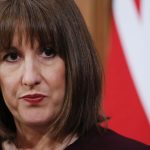A question that’s been asked a lot about Keir Starmer is, which bit of being prime minister is he a natural at? Everyone knows he’s not Mr Charisma, could he be Mr Competent? Huh, after six months of bad optics, that wasn’t flying either.
It turned out yesterday [Tuesday] that he is incredibly good at surprise escalation. Before noon, we were in a world where the prime minister was about to ride two horses all the way to the US – the horse that supported Ukraine, and the horse that was happy to see a “peace deal” devised by Putin and bloviated by Trump.
After noon, when Starmer addressed the Commons, wherever we were, we weren’t there any more. “The historical load we must carry to fulfil our duty is not as light as it once was,” he said, and this is politics in old money, insofar as it makes no sense at all. History itself doesn’t get any heavier, it’s like the old proverb about a pound of feathers versus a pound of lead. Unless, of course, you mean history as recent as last week, and Donald Trump’s refashioning of Volodymyr Zelenskyy as the real dictator; in which case, why not just say, “the load of last week has been considerably heavier, since last week happened”?
Unarguably, though, Starmer made some arguments that resulted in concrete decisions: and that, alone, was incredibly surprising. Some of them were obvious – he was a young man when the Berlin Wall came down, he reminded the house and, later, the nation: he thought he was looking at eternal peace in Europe. The sight of Russian tanks rolling into cities was more than yet more current affairs in a bleak few years, it was the end of an era. “Instability in Europe will always wash up on our shores. Tyrants like Putin will only respond to strength. We must stand by Ukraine, because if we do not achieve a lasting peace, the threats to our security will only grow.” OK, 2022 called, it wants its arguments back, also its bubble tea.
The difference this time was the follow-through. Defence spending will go up to 2.5% of GDP by 2027, and 3% by 2030. This will come out of the aid budget, which can plug the gaps to get defence to 2.5 – although charities are already staggered by the trade off – but can’t get it to 3%.
Various journalists raised this in the press conference later in the day, and whatever you think of that “tough choice” – Ed Davey doubtless spoke for many, when he said that it should come from frozen Russian assets and taxing super-wealth rather than the most ravaged countries on earth – it was stunningly unexpected, again, to hear a Labour politician say what they should have been saying since forever. In so many words: you people can’t have it both ways. You can’t demand tax cuts and social justice. You can’t have security on thin air. You can’t keep demanding contradictory things, just because you have a mic and a commanding voice. It was so refreshing to hear that case made bluntly – that to spend nothing at all cannot be the primary purpose of government – I may have embellished it a bit.
Sky’s Beth Rigby didn’t ask an austerity business-as-usual question. She landed two other points – first, was Trump, after his casual destruction of USAid, the real reason this money was coming from the aid budget? Was Starmer performing Churchillian independence of mind, while getting his ideas from the hooligan’s playbook? Starmer’s answer was actually quite good, and I don’t say that lightly: “I’ve been arguing for some time that European countries needed to do more. Yes, it’s true, President Trump thinks we should do more, and I agree with him.” Ok, strictly speaking, it did not answer the question, but it was still deft: it could flatter a dumb adversary, which Trump certainly is, into thinking he’d won, without surrendering anything real, in terms of values.
The best exchange by far was with Chris Hope from GB News. Defence spending up by yay much in 2027, more still in 2030, these were all promises in the Reform manifesto. In a blokey, mischievous, slightly needling voice, he asked “Are you Nigel Farage in disguise?” Hope hadn’t read the room. “Nigel Farage didn’t even turn up to the debate in parliament today,” Starmer replied, impatiently. “Nigel Farage is fawning over Putin. That is not patriotism. What I’ve done is take the duty of prime minister seriously.” Is this actually the beginning of something, where we don’t have to pore over polls and say, “Reform are doing well, ergo Reform must be making sense, ergo we must all be more like Reform?” Too early to say, we can but hope.
Rigby’s other point was a little chilling: “You sound like a prime minister on a war footing. Should viewers be alarmed?” And Starmer didn’t really need to answer that, as his two speeches had said enough: I surprised you, didn’t I? Of course you should be alarmed.












